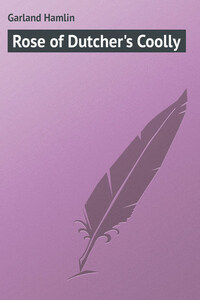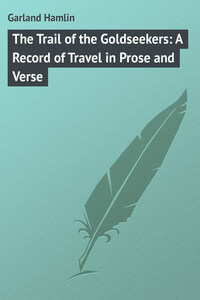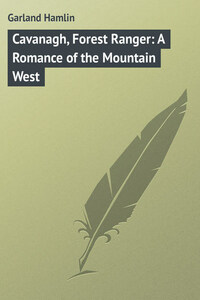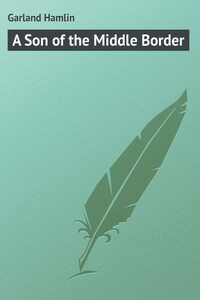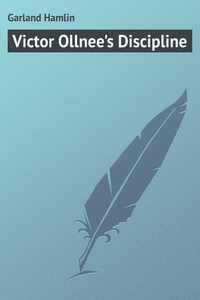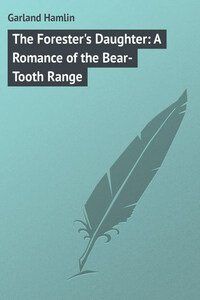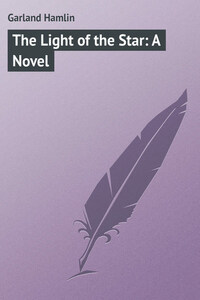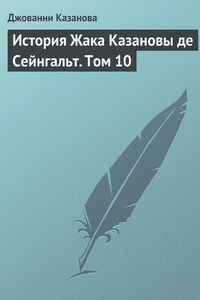Rose was an unaccountable child from the start. She learned to speak early and while she did not use "baby-talk" she had strange words of her own. She called hard money "tow" and a picture "tac," names which had nothing to do with onomatop[oe]ia though it seemed so in some cases. Bread and milk she called "plop."
She began to read of her own accord when four years old, picking out the letters from the advertisements of the newspapers, and running to her mother at the sink or bread-board to learn what each word meant. Her demand for stories grew to be a burden. She was insatiate, nothing but sleep subdued her eager brain.
As she grew older she read and re-read her picture books when alone, but when older people were talking she listened as attentively as if she understood every word. She had the power of amusing herself and visited very little with other children. It was deeply moving to see her with her poor playthings out under the poplar tree, talking to herself, arranging and rearranging her chairs and tables, the sunlight flecking her hair, and the birds singing overhead.
She seemed only a larger sort of insect, and her prattle mixed easily with the chirp of crickets and the rustle of leaves.
She was only five years old when her mother suddenly withdrew her hands from pans and kettles, gave up all thought of bread and butter making, and took rest in death. Only a few hours of waiting on her bed near the kitchen fire and Ann Dutcher was through with toil and troubled dreaming, and lay in the dim best-room, taking no account of anything in the light of day.
Rose got up the next morning after her mother's last kiss and went into the room where the body lay. A gnomish little figure the child was, for at that time her head was large and her cropped hair bristled till she seemed a sort of brownie. Also, her lonely child-life had given her quaint, grave ways.
She knew her mother was dead, and that death was a kind of sleep which lasted longer than common sleep, that was all the difference, so she went in and stood by the bed and tried to see her mother's face. It was early in the morning and the curtains being drawn it was dark in the room, but Rose had no fear, for mother was there.
She talked softly to herself a little while, then went over to the window and pulled on the string of the curtain till it rolled up. Then she went back and looked at her mother. She grew tired of waiting at last.
"Mamma," she called, "wake up. Can't you wake up, mamma?"
She patted the cold, rigid cheeks with her rough brown little palms. Then she blew in the dead face, gravely. Then she thought if she could only open mamma's eyes she'd be awake. So she took her finger and thumb and tried to lift the lashes, and when she did she was frightened by the look of the set faded gray eyes. Then the terrible vague shadow of the Unknown settled upon her and she cried convulsively: "Mamma! mamma, I want you!" Thus she met death, early in her life.
After her mother's burial Rose turned to her father more hungrily than before. She rode into the fields with him in the spring, when he went out to sow, sitting on the seeder box with the pockets of her little pink apron filled with wheat, and her sweet, piping little voice calling to the horses or laughing in glee at the swarms of sparrows. When he was plowing corn she rode on the horses, clinging like a blue-jay to the rings in the back-pad, her yellow-brown hair blowing.
She talked sagely about the crops and the weather, and asked innumerable questions. Often John could not hear her questions, which were like soft soliloquies, but she babbled on just the same.
"See the little birds, pappa John. They's 'bout a million of 'um, ain't they? They're glad spring has come, ain't they, pappa? They can understand each other just the same as we can, can't they, pappa John?"
John Dutcher was not a talker, and he seldom answered her unless she turned her eager face to him, and her bird-like voice repeated her question. But it mattered very little to Rose. She had her father's power of self-amusement. In case she got tired of riding about with him she brought her playthings out and established them in a corner of the fence. Her favorite game was playing horses.
Her horses were sticks of the size of canes, and of all sorts and colors. Each one had a name. How she selected them, and why she selected them out of the vast world of sticks, was a mystery to John Dutcher.
The brown stick she called Dan, the fork handle, Nellie, and the crooked stick with the big knot was Barney. She had from six to ten and she never forgot their names. Each had a string for a bridle and they all were placed in stalls, which she built with infinite labor and calculation out of twigs. She led each stick by its halter up to the manger (a rail) on which she had placed oats and grass. She talked to them.
"Now, Barney, whoa-whoa there now! Don't you kick Kit again – now sir! Kit, you better stand over here by Pete – Barney, you need exercise, that's what you need – yessir."
